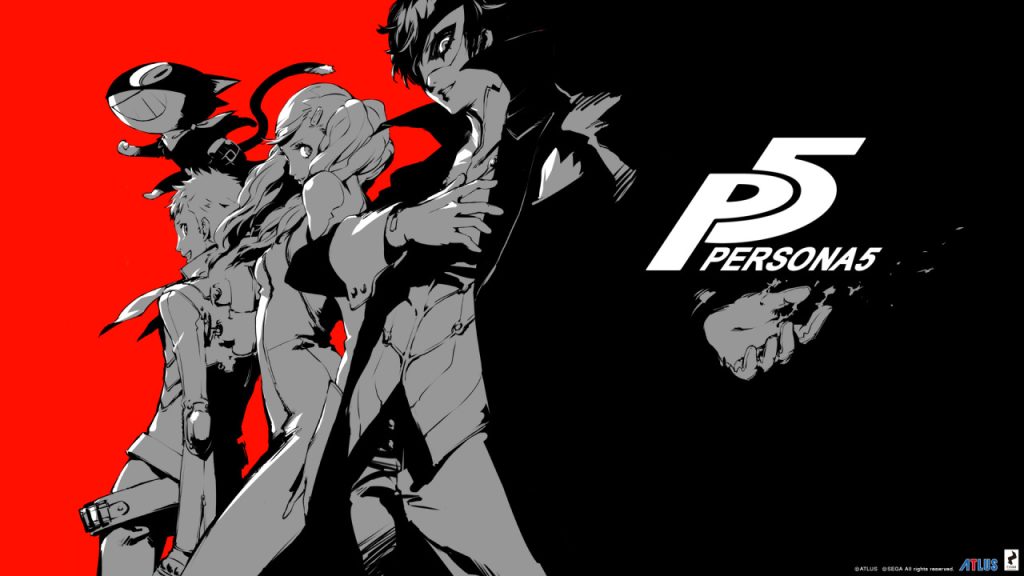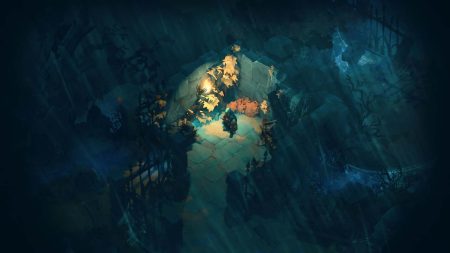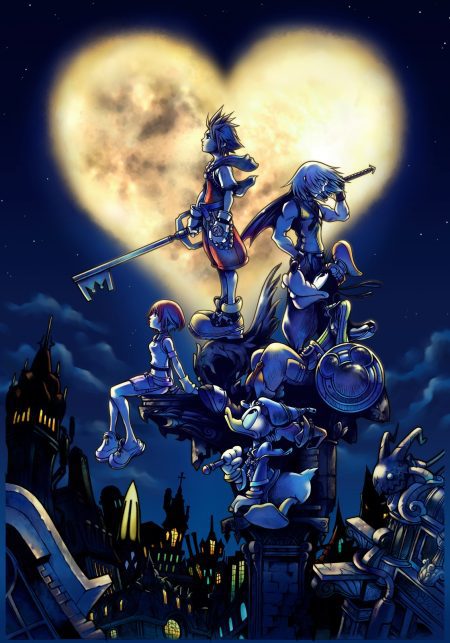Whoooaaa! Looking Cool, Joker!
Disclaimer: There are sections featuring some heavy, endgame spoilers relevant to the review. Those sections are safely marked. As with any review, minor spoilers persist throughout the article. Be aware.

At the time of this post, three Punished Backlog writers have finished Persona 5 with a certain Punished Founder taking an extended hiatus after the first Palace. For context, the game took me 106 hours to beat, as well as an additional 21 spent in NG+. I had little Persona experience prior to P5, only spending (roughly) 30 hours in P4 Golden. That may seem like a lot, but 30 hours barely scratches the surface.
Persona 5 was announced in 2010 as a very promising PS3 game, finally hitting Japan a system later on September 15th, 2016, reaching America the following Valentine’s Day. During the long hiatus between entries, the Shin Megami Tensei Team produced the highly regarded Catherine, a trippy, puzzle platformer/psychological exploration that dropped in 2011, more on the Catherine influence later.
Anyone trying to explain the core mechanics of the franchise eventually settles on the “one part Sims, one part Pokemon” comparison, and for good reason. It is a unique JRPG/Life Simulation that throws Joker (the protagonist) in a brand new school. There, he takes classes, bonds with classmates and other key characters, and experiences Shibuya’s wealth of activities–ranging from catching a movie to exploring one of the many taking on comically large, burger challenges. These daily activities develop your character’s skills, raising proficiency, charm, guts, kindness, or knowledge. If you study in a Shibuya diner and order a sole coffee, Joker simultaneously raises his knowledge while boosting his guts; the rationale being he ordered very little for the amount of time occupying a booth.
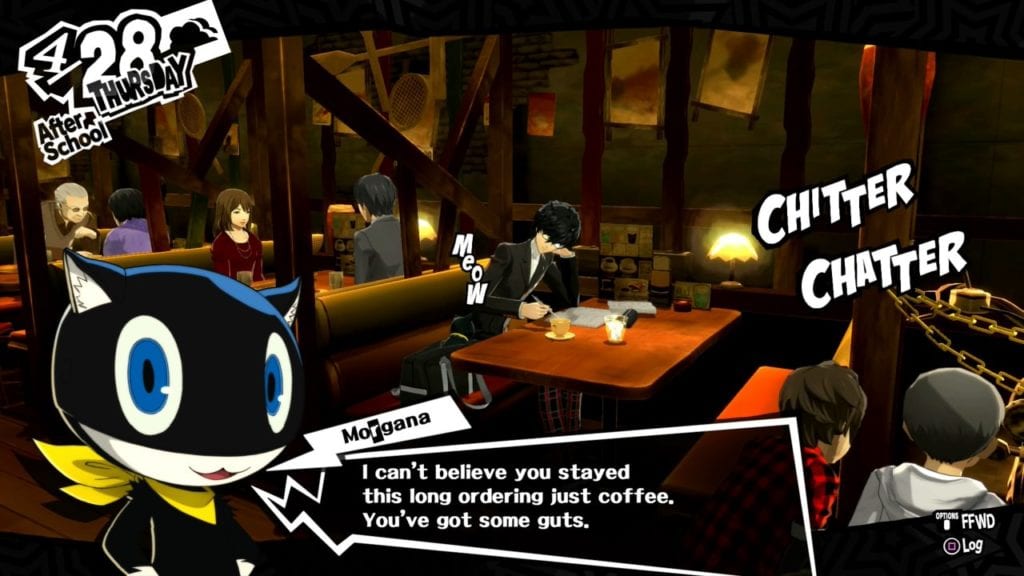
I bet he skimped on the tip, too
In addition to (no joke) taking midterms and jetting off on school trips, Joker and his friends become The Phantom Thieves: superheroes using a mysterious app to enter a reality constructed by an abusive individual’s distorted desires, purging them of all corrupt feelings. Here, we enter the Pokemon comparisons. The P-Thieves (as they’re often abbreviated), manifest their true selves into “Personas,” effectively summoning heros. Then, employing their heroes to battle the shadows they find in the alternate-reality.
The world moves in pseudo-real time, however. Every action takes an available timeslot, with the freedom to allocate (usually) two activity-decisions a day. For instance, Joker can hang out with a back-alley doctor after-school then do laundry in the evening, but has one less day to purge the soul of a target.
Story (Light spoilers)
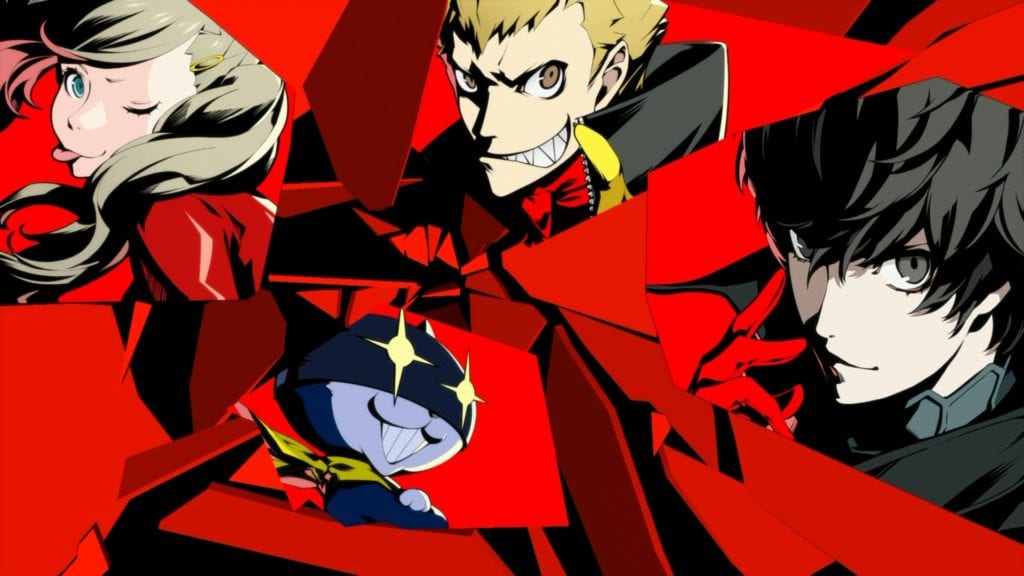
Despite focusing on cracking a murder investigation, Persona 4 is a relatively light game. Instead of following suit, Persona 5 borrows a lot of maturity (and certain locations) from its stylistic/spiritual predecessor, Catherine. To start the game, Joker transfers schools because he saved a women from certain sexual assault at the hands of a drunk man, who proceeds to trip, breaking his arm and suing Joker as a result. You now have a criminal record and are treated like trash by your peers for the next 30 hours.
There’s scenes depicting suicide played out in real time, implied rape of a high school girl, more sexual and physical assault, and then you beat the first dungeon. Rebellion against adult corruption and repression is a major theme of the game, and Persona 5 often lays it on heavy, pulling few punches in depicting how awful certain NPCs can be.
The story plays like a TV show, in that the game follows the entire lifecycle of the Phantom Thieves as opposed to a single, tangible goal. Often times, there is no big picture as the group struggles with what it means to be anonymous vigilantees. There’s no looming final boss or end goal for–probably–the first 80 hours (even if there’s a pretty blatant lead-up). Instead, we see the day to day activities of this team as they face challenges that develop around them. However, for a game this long, that is absolutely an advantage. It kept the game fresh and combated a lot of fatigue. Just as you’d binge a season or two of your favorite show, there were fresh character arcs and mini journeys every 10 hours or so. Persona 5’s story plays more like a three-game trilogy or an entire TV series contained on a single disc than a traditional game. Even 70 hours in, the story seems fresh as you watch the characters you love find new, wacky narratives to explore.
There are a couple of story-problems that need addressing:
- Confidant links often feel completely isolated from character development as told by the main narrative
- There are VERY important, late-game moments that are explained deplorably
- There is an unofficial “epilogue” after (what appears to be) the final fight that–while making a good effort to be relevant–feels like an afterthought
Touching on the confidant links, the side stories are genuinely amusing and charming. I developed a new appreciation for certain team members, and otherwise commonplace NPCs were given new life as you help them progress through their own, well-crafted arcs. As an extension, almost every single women in the game–ranging from teammates to your teacher–can be dated, and dated at the same time. However, dating never comes into play in the main story aside from roughly three dialogue options in a game that took me 100+ hours to complete.
The work I put in the confidant stories never showed in the main questline (save for one, endgame moment). For instance, Ann–who I would eventually date–spends her confidant questline developing strength of will and perseverance. A day after a major breakthrough though, she’d go back to the comic-relief “airhead” trope, redacting every emotional moment we shared. As far as I can tell, there are only a couple of moments you can gossip about whatever relationship you’re in and the partner of choosing remains completely anonymous the entire time. Your girlfriend will occasionally text you lines like “We should hang out today! We don’t have to tell anyone, either!” Aside from actually being a red flag of an abusive relationship, Persona 5 is all about the strength you get from interpersonal connections, it feels like a shortcoming that they’d bury such an important brand of relationship.

A total slap in the face
Complaint 2: As you likely gathered from the introduction, Persona 5 has some pretty weird narrative twists. It’s one part true-crime, one part political conspiracy, one part supernatural thriller. This level of complexity requires very professional exposition. Unfortunately, many of the more complicated details of Persona 5’s story are left by the wayside under the guise that the events which took place are just too complicated to understand, so Joker never bothers following up.
One especially bad scene features supplementary stick figure drawings, courtesy of the game’s resident artist depicting “what probably happened with the main character.” It’s both incredibly charming and incredibly frustrating. A few plotlines and bread crumbs are swept away tens of hours later, never developed further. While that isn’t experience-breaking, it happens so late in the story it can feel anticlimactic and dishonest.

Lastly: the last part (END GAME DETAILS INBOUND, SKIP BELOW). The end of the game is not the end. A supplementary chapter introduces radical changes. While simultaneously not spoiling too much and the entire game, it’s heavily implied that you had no autonomy the entire story. That is a gross oversimplification, but Persona 5 suddenly tasks you with destroying a puppet-master figure that is only introduced in the closing hours.
It wasn’t necessary. In fact, it could be argued the game would have been better off scrapping the entire plot-devise. Personally, I don’t believe so. I was honestly indifferent to the subplots inclusion. It actually features one of the more humanizing moments you share with you team, as you’re tasked with convincing them all, individually, to stay a member of the Phantom Thieves. It’s a really nice moment showing how far each character progressed, especially after spending a hundred hours with them.
However, there is definitely a valid frustration to ending such a lengthy story on such a worn trope.
Gameplay (SAFE TO READ AGAIN)
The actual JRPG combat is enjoyable. Characters have elemental and support abilities, hosting both type advantages and disadvantages. Same is true for the enemies (shadows) you face. If you hit an enemy’s weakness, they fall, you get an extra turn, Morgana (your guide) yells “Whoooaaa! Looking Cool, Joker!” every. single. time. The real fun comes from mixing and matching. A “One More!” gives a you an extra move, or the chance to “Baton Pass” to another party member, letting them attack for you with an offensive boost.
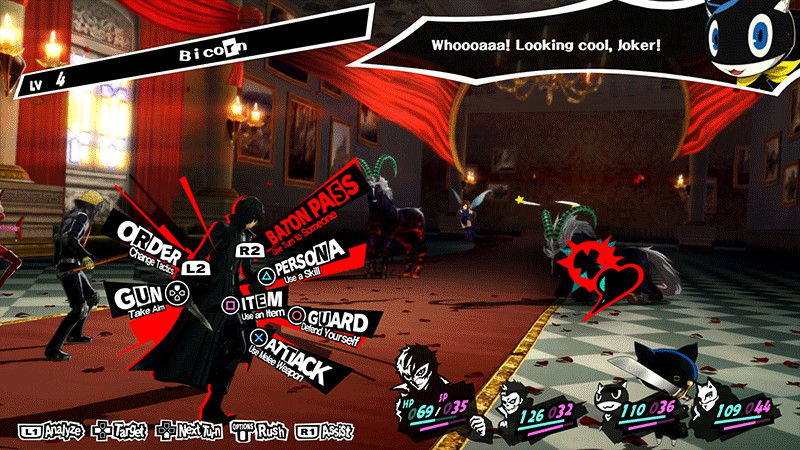
I’m serious, every single time
Persona 5 then becomes a deeply strategic game where you gracefully (and very stylishly, so very stylishly) string together wild combos, flattening waves of enemy the second a battle begins. There are additional incentives to hunt for weaknesses. Knock every enemy down and you enter a “Hold Up.” At the press of a button, you can either have your entire party rush in for a massive beat-down, or negotiate for either items or to absorb and employ the Personas you face (and we’re back to Pokemon).
When not exploring the game’s dungeons, you explore the world, allocating some time to studying, going to the gym, hanging with friends, or working a part time job. Every moment does something beneficial–raising one of the five, aforementioned social skills. While these skills will not help you in a dungeon, almost every confidant link will have at least one social prereq somewhere down the 10 “chapters.”
You may have to be a certain level of kindness to empathize with a character’s struggles or have a certain charm to impress chess-playing church girls. In a few instances, you honestly may be too stupid to date someone. The confidant rankings give real skills to bring to battle. While often partner abilities, the skills range from shop discounts to new battle tactics (the latter being especially useful).
The dungeons themselves are explicitly-designed, a first for the series. While this does provide a more interesting atmosphere than the randomly generated hallways of previous entries (a feature that exists as the lingering side dungeon “Mementos”), often the puzzle design is weak. They are far from the challenge of a Zelda game. More often than not, you are tasked with pressing a button, or using a feature reminiscent of the Arkham series’ detective mode to also press a button. While there is some interesting variety–no two dungeons feature the same challenge–every dungeons lasts a phase too long.
Going back to Persona 4 Golden, I was shocked at how quickly I tore through the procedurally generated hallways in comparison. The dungeon themes quickly get tired, the challenges become redundant, and eventually the 15 unique enemies get repetitive, even if the combat loop is satisfying.
I never felt the need to grind, much, though the option was there. The side quests felt uninspired, even though a side quest was blown into a 30 minute, stand-alone anime (a pretty decent one, at that). On the subject of anime, Persona 5: The Animation is slated to release early 2018 if you’re more interested in watching the story in manageable chunks than sinking over 100 hours in the game.
Presentation
Persona 5 excels at delivery.
Music: Perfect
Visuals: Perfect
Character Design: Perfect
[youtube https://www.youtube.com/watch?v=kJIGlas15Uk]
The opening credits perfectly articulate the visual tone of the game
Any other year, Persona 5 would be, hands down, my game of the year for presentation alone.
I have never played a game like it visually. The game is so stunning, people cosplay as the game’s menu. That is completely absurd. Beautifully intense black on red color palettes seep through every facet of the game. This motif/attitude is perfectly articulated in the opening credit which I watch three times a week at my day-job.
As thieves, your party each gets an incredible superhero costume upon the “activation” of their persona. The character design in this regard is unparalleled. I don’t have a single complaint about how unique every character looks when tearing through a dungeon.
But, oh man, the music–the music is so good. Persona 5 may boast my favorite soundtrack ever. When The Punished Backlog inevitably discusses the greatest songs in gaming, you better believe I’m fighting on Persona 5’s behalf. Every song is driven by an intricate and intoxicating bassline. Admittedly, the lyrics make no sense at all, but they’re sung in such a way that I couldn’t care less. That doesn’t stop me from singing along to “The Last Surprise” on my morning commutes.
Two types of cutscenes supplement the killer soundtrack and vintage-rock color palette: Conversations rendered in-engine and legitimate anime. While I was never turned off by the doll-like character models–partly dude to the well drawn figureheads attached to each text-box–I definitely enjoyed seeing some big scenes in full anime, a genre I don’t usually consume. There’s a level of charm and movement that would have been lost sticking exclusively to the in-game assets. I, a sucker for storytelling, thought the change in medium was a definite plus. If that isn’t your thing, rest easy knowing less than an hour of cutscenes take that form.
Final Thoughts
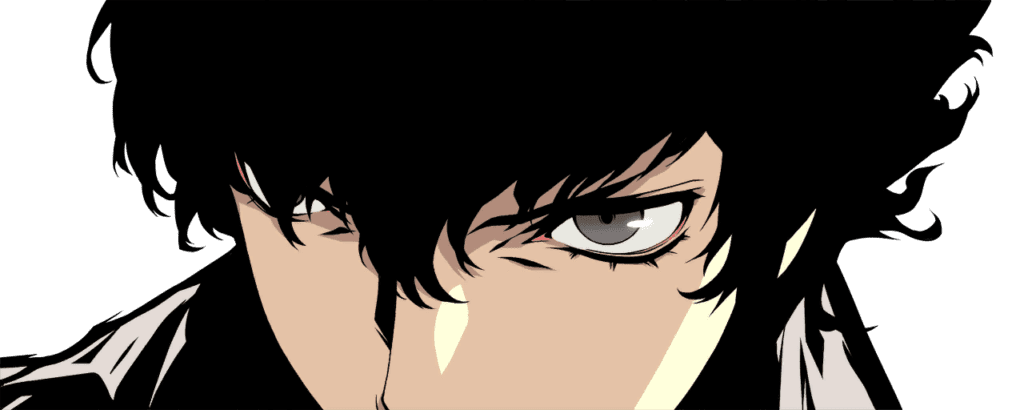
Persona 5 is a really good game. I mentioned a lot of criticisms, but–dungeon design aside–none of them really left a poor taste in my mouth. Again, I chugged through 137 hours of the game before I decided to write a review. That’s far more hours than I spent in Breath of the Wild. While playtime does not directly equate to quality, no issues prevented me from enjoying the game all the way through.
Something I will note, totally independent of the main game, New Game Plus has been a bit disappointing. There is absolutely a point of no return in the main campaign as well. I left a couple of confidant paths unfinished therefore some sidequests still on the table, but you will hit a point where you’re no longer able to play the game, locked into an, almost, on-rains narrative until the final credits roll. If you play the game, get your affairs in order before it’s time for endgame.
To write the review, I made a rudimentary pros-cons chart I’ll include below for a fast take on what makes the game shine.
In closing: Persona 5 is a very long, enjoyable road. Definitely a serious undertaking, but it will go down as one of the best games in the genre and one of the best games of the generation. Whether you watch some clips on youtube or grind your way to Platinum, this game must be experienced in some form, even if you’re waiting for the rhythm game, spin off that was announced a few weeks ago.
Score: 9.4/10
| Good: | Bad: |
| Music is phenomenal | Don’t love the in-engine cutscenes |
| Stylish Graphics and UI | Puzzle design is deceptively weak |
| Anime cutscenes | Palaces run long |
| Charming cast of characters
Character design of P-Thieves Costumes are remarkable |
One, massively glaring narrative collapse
(Really terrible explanation of “the scene”) |
| Heavy themes right out the gate | Last segment felt stapled on last minute
Poor development post narrative |
| Funny and engaging set-piece moments | Poor Replayability (opportunity to sweep up lingering tasks) |
| Combat loop is enjoyable
Combo system is really interesting |
Loveless relationships |
| Shadow’s have well written lines
Localization is fine! |
Dialogue trees have zero sway in leading scenes/plot |
| Loooooooong. The story rarely dips. Truly evolving | Some cultural incongruities |
| Most confidant trees | Maybe too long? |
| Some difficulty scaling issues |
PJ's played games for the better part of 16 years. His earliest gaming memory involved going to his neighbor's house to play GTA Vice City way too young. His second was being thoroughly unamused at a demo in Target. It was weird and hard. You had to keep swinging on ropes. That game was The Wind Waker, his favorite game of all time.
He speedruns. He writes about speedrunning.
He plays music. He writes about music.
He Tweets. Find it here: @HashtagPManning


